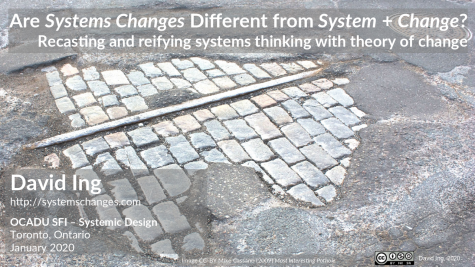The Systems Changes Learning Circle has met at least every 3 weeks over the past year. As part of an hour+ lecture to introduce systems thinking, students in the Systemic Design course in the Master’s program in Strategic Foresight and Innovation at OCAD University were immersed in questions where we’ve focused our attention, complemented by background into traditional foundational materials. An audio recording has now been matched up with presentation slides, so that learners outside the classroom can partially share in the experience.
This lecture begins with the rising interest in “systems change”, that is related to “theory of change” from funders of social innovation programs. From there, the lecture aims to recast (speak in a different way) and reify (make some specified ideas more prominent) an understanding of systems thinking.
The presentation was overprepared — we can’t predict how engaged students will be on the ideas, before their brains are full. Of 55 slides, we stopped on slide 37. For streaming, the video is accessible on Youtube. (with a 6-minute excerpt on the Luoyang Bay abalone farms from the documentary Watermark, by Edward Burtynsky, removed).
Viewers who prefer to watch video on a disconnected device can download a video file.
| Video | H.264 MP4 | WebM |
| January 17 (1h18m) |
[20200117_OCADU_Ing HD m4v] (HD 2814kbps 1.7GB) [20200117_OCADU_Ing nHD m4v] (nHD 210kkps 179MB) |
[20200117_OCADU_Ing HD webm] (HD 470kbps 392MB) [20200117_OCADU_Ing nHD webm] (nHD VP8 114kbps 184MB) |
Readers interested in the full set of 55 slides are welcomed to view them online or download them.

The original audio recording for the January 17 session (part-time cohort) was used for the web video. The audio for the talk on January 15 (full-time cohort) was based on the same slides, time extended by the students working through some sensemaking.
| Audio | |||
| January 17 (1h18m) |
[20200117_OCADU_Ing SystemsChangesDifferentFrom.mp3] (72MB) |
||
| January 15 (1h27m) |
[20200115_OCADU_Ing SystemsChangesDifferentFrom.mp3] (80MB) |
||
Here’s some additional details posted to the course discussion board, after the audio had been released.
The lecture is based on ongoing development by the Systems Changes Learning Circle, at http://systemschanges.com/online/ . Prior lectures more aligned with the prior canon (e.g. building up from Russell Ackoff’s work (in line with the textbook by Jamshid Gharajedaghi) are mentioned:
- “Full version: “Rethinking Systems Thinking: Learning and coevolving with the world”, Aalto University, 2012/11/26” at http://coevolving.com/blogs/index.php/archive/full-version-rethinking-systems-thinking-learning-and-coevolving-with-the-world-aalto-university-20121126/
… (that lines up with the publication of “2013/10 Rethinking Systems Thinking: Learning and Coevolving with the World” at http://coevolving.com/commons/201310-rethinking-systems-thinking ).- “Design Flaws and Service Systems Breakdowns: Learning from Systems Thinking” from 2013/10/07 at http://coevolving.com/blogs/index.php/archive/201310-lectures-at-aalto-university/
… (that lines up with the publication of “2013/12 Design Flaws and Service System Breakdowns: Learning from Systems Thinking” at http://coevolving.com/commons/201312-rsd2-design-flaws-and-service-system-breakdowns … a lecture that was given at OCADU for a few years).In addition, there was a course for the U. of Toronto Faculty of Information graduate program in 2018, at http://coevolving.com/utoronto/201801-SystemsThinking-SystemsDesign/ . Each day has a set of recommended readings — students picked from them, not reading them all — under each “Day”.
The 6-minute video we watched as an excerpt of Abalone Farming, Luoyang Bay, Fujian, by Edward Burtynsky (2013) Watermark, https://www.edwardburtynsky.com/projects/films/watermark . (I borrowed a DVD from the Toronto Public Library).
The 2-minute video, late in the presentation that we didn’t yet cover, is from “The Harvesters: | July 19, 2010 | The Met, on Youtube.
The challenge of shifting towards “systems changes” as a first-class concept, and away from “systems thinking” that tends to lead people towards thinking about changelessness, has been an ongoing discussion amongst we three instructors for the Systemic Design course at OCADU. We’re trying to strike the balance between our current-day appreciation of learning and teaching systems thinking for some decades, and the standard textbooks that are rooted in an 1980s, pre-Internet, pre-globalization world.


